| Articles de presse Dead Can Dance » 1993 |
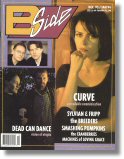 |
Dead Can Dnace » Vision Of Utopia The Beauty Of NaivetÈ |

Lisa Gerrard and Brendan Perry would have done the right thing. They would have made us stop the car to encourage his dance of celebration. It was their magnificent 'Yulunga' brought to life.
As the sun descends toward the Pacific and the night steals up over the Eastern sky, I have the honor of speaking with Lisa and Brendan Perry, musical catalysts for Dead Can Dance. This is a rare day, I'm told, clear and inviting, unusual for Los Angeles in August. Perhaps the clay is celebrating that they are sitting here on this roof top garden sipping Coronas and totally dispelling any notion that there's anything mysterious about them. Lisa, who gave up on interviews years ago, is a wonderfully energized per¬son who stares you steadily in the eye, not in challenge but to examine Your innermost thoughts. Jaunty Brendan has been liv¬ing in Ireland long enough to have adopted a look of rustic coun¬try casual, comfortable and warm: a reflection of his personality.
He's tired tram working on the video for 'Yulunga' during the clay. But his weariness does nothing to halt his determination to dispel any foolish notions anyone may harbor about Dean Can Dance. Haughty? Dark? Stuffy? G-G-G-G-gothic? Not on your life! I know never to use the G ward within his earshot unless we're discussing architecture. Or other people's music.
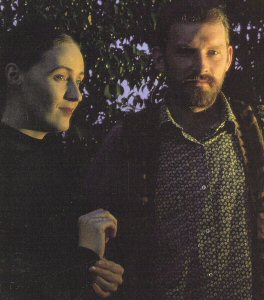
You can tell they've been soulmates for ages, especially during their photo shoot. Brendan keeps needling Lisa to look at the camera. He finally jests that ever since someone told Lisa she had a beautiful profile, that's all you'll ever get tram her. She also has beautiful blue eyes which are perfect for directing dirty looks at Brendan.
As the sun goes for a swim I decide we' d better talk about the brilliant Into The Labyrinth, the first complete offering tram Dead Can Dance in three years. I know we'll go off road with our topics very quickly. First, don’t get the idea they were indulgently craft¬ing this album for three years: they were also busy with theater scores and film work. Brendan declares, "We're very happy with this record, ourselves, content with the record. The record reflects us being at peace with ourselves, a reflection of our lives."
Lisa nods toward Brendan, adding, "It's also mainly to do with you, because you took direction in the early stages. I was prepar¬ing orchestral sounding things, and Brendan was working on those things that he wanted us to do together. He wanted them to be percussive; he wanted us to be trying something different."
" !t reflects the joy we find tram things in life: the understanding; Lisa is married now and has a little child; that helped influence the outlook on the world, bringing a greater sense of optimism," he describes. "I am very much rooted in Ireland, having been there for five years. I feel really well there, living in the country¬side, harmonizing with nature. I've learned to pace my relation¬ship with earthy people, who are direct and honest."
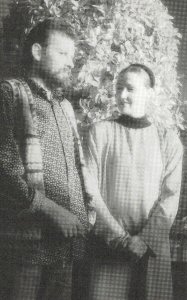
Lisa had returned to Australia because her mother became ill. It brings home the reality that these people are very dear to you and you want to be near them. So I moved there, but it's always a
transitory condition. My family is there, so at the end of the clay they are who you need to be with. But it's not always going to stay like that. I really like Ireland; I had an attachment to it."
Brendan was barn in Britain, although he moved to New Zealand in his teens. Lisa was barn in Australia, and their first travels together took them tram Australia to England in 1982, young lovers looking for their destiny. "We’ve always been on the move. We decided that nothing was happening for us in Australia 12 years ago, and Brendan knew nothing was going to happen for us here. He had very strong ideas of what he wanted to say globally with his work. I didn’t at that time. I was happy to just go along for the ride, just seeing everywhere and doing whatever it took to sing, really. But he was the one who had the premonition. When I look back I was incredibly naive at the time. I just followed him; he rode the bike in front and I came along behind..."
" Oh stop it; you're embarrassing me!" interrupts Brendan as he playfully slumps clown into his chair, waving Lisa's words away.
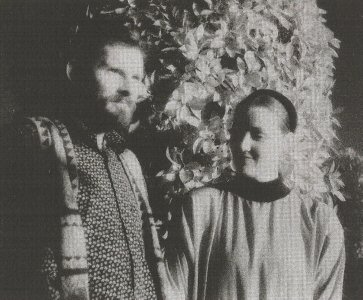
Lisa lets out a ringing laugh, exclaiming, "Well it's true! I was only 20 years old and I didn’t know what was happening! I just really believed in what we were doing together. It was the most important thing in our lives!
" I still don’t know, with my work... I still feel like it is this force that moves without my control! It's something that ends up in this place and I am fortunate enough that other people are hear¬ing it! And whether they were hearing it or not, I would still be doing it. This course of events has taken its direction due to the tact that I have been involved with other people who knew which course of events to take," she explains. "It's also due to the tact that we met Ivo, and he was interested in our work. Because there are a lot of people going to London with their work in their hand, like us, with these ideals about their work and it's very hard."
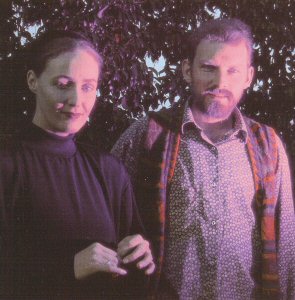
And it is lucky that 4AD and Ivo found this duo, before someone else could snuff their unique spark. "That's the part that fright¬ened us," agrees Brendan. "The actual broadness of musical influ¬ence that we bring into what we consider the whole spectrum of Dead Can Dance, is its catalyst. It's very confusing to a company who thinks in terms of its markets."
" It's always been more of a friendship with us," explains Lisa. "Its never been a case of..." She interrupts herself to exclaim, "It's only now that I realize how it really is, and how different he [Ivo] is. Someone said something to me yesterday , oh, these big record companies, they don't want to be involved with someone who really
had any artistic dedication because they are too problematic! They
only want to be involved heavily with someone that they can ma¬nipulate.' And that hit home! You realize that Your fragile relation¬ship with the work is being respected. We really appreciate it."
" It becomes a situation where the artist becomes a creative slave," murmurs Brendan. "It' s just a crazy contradiction of what it could be."
Record companies are adept at discovering a chink in an artist's mental armor. Where are they under confident; better Jet, how can we controI them through their deepest fears or desires? Brendan declares, "It's like the Church of Scientology! They come in, saying that they can make you a better person, then they staff disorienting you by giving you lots of affection."
Of course, with the record companies, it's affection and money.
" Oh yeah! They find the people who have this empty center, who feel alone and need that... when they get that, the company binds them to them. It becomes a religion of extortion. It' s parasitical," murmurs Brendan.
And for all these yeaTs Dead Can Dance has always remained crue to themselves and their incredible music. It's good to be able to have faith in something now that crue creativity is at a premium. "We've always recognized the dangers in that. We want to remain complete people; we want to be autonomous. We don't want to sacrifice our consciousness for fame and money," Brendan laughs softly.
" This is the difference between somewhere like here, and where we've lived. It's so easy to be seduced by the ambience by a place like this. It' s impossible to be seduced by a place like the Isles of Dogs or the places where we were playing. They were not seductive," Lisa forcefully stresses. "It was bloody hard work to get a performance together where we were, and people were not forthcoming. They were not reciprocating what we were doing. It was a battle. It's not like here where it all gets blown out of proportion; we've never had any of that. It's only happening now, you know! We're holding onto the little bit of earth that we can in order to survive this whole experience! And hopefully the work will transcend this experience.
We are mature enough not to be affected, hopefully... no, not hope¬ fully: it won't be," Lisa states with firm finality.
So Dead Can Dance have been tempered by their previous trials. Lisa nods, explaining, "Just what we've been through together as two human beings, that relationship, that' s what has been important in our work. All of those pressures have come in. It just hasn't been a work relationship, it' s been two people experiencing twelve years of their lives together, and the work being completely a part of that. But I feel that things are clearer to me through twelve, actually fifteen years of work. People say 'how can you say that?' It's because my work has allowed me to crea te a sensitivity in my life that allows me to see. Otherwise 1 am not sensitizing; 1 am numbing. And if 1 get together with Brendan it's like thank God! Because you know that this pers on has also tempered, has molded the sword. He' s ham¬mered the hot irons of his existence into some shape that is tangible and can be thrust into the earth and held aloft and waved around, ecstatic and excitable. It' s not falling apart, neurotic, anxious, stressed... You can't ever divorce Your personallife from the work."
" The work has never existed apart from our personallife," Brendan reinforces. "People grow and they suddenly have trouble with the principle that art is life and life is art, which is what it should be."
That's why you don't like Los Angeles, where more often it is art as artifice. "Oh exactly, yes," agrees Brendan with a sly smile, point¬ing, "Actually, that chair is not really there, it's an illusion. It's a figment of your imagination."
" No, it's an abject put there by the enemy actually," declares Lisa in dramatic tones. "It's the ultimate optical illusion. You have to watch out for the enemy...be careful," she whispers.
Mentioning the enemy causes Lisa to wistfully reflect about watch¬ing a young band walking into 4AD's offices earlier in her visit. "They so reminded me of Brendan and myself when we first walked into 4AD in London. And you think, bloody hell, you are so lucky to be walking in here! Really, they were so sweet and unaffected and fragile, and thank goodness they walked into here!"
And thank goodness they didn't walk into one of those humon¬gous factories like...ahem...
Brendan playfully urges, "Go on, say names, say names! I want names now!"
Evil man! Allright...like, oh, let's say Warner's, distributors of 4AD in the US. Luckily, Dead Can Dance has the luxury of having the big W behind them instead of on top of them. ."They are actually behind Ivo... we're even further removed," Lisa laughs, admitting, "I will never be able to perceive, and I know Brendan will never be able to, 'oh, will this sell?' That is just like a foreign language."
" It's like when you walk into the main foyer and calI, 'is anyone home!'" Brendan laughs. "But then again, it's the nature of the multinational type of company. You find out that this album is being
released when three hundred other albums are that week. Whoa!
That's the Warner scope. And when you put yourself into the scope of where you fit in there, it's scary."
Lisa gasps, "I didn't know that," as she agitatedly sips her beer. But bath hope that the people are beginning to clamor for bands with a real soul. "It's always been a social contract in a sense, a Rosseauian type of thing. It's those people who enact a change in things. You have people who focus and push out the same product all the time, then people get bored and want change. Unfortunately it takes a long period of stagnation before you get the dynamics of change within the society. Call it a ten-year cycle," describes Bren¬dan.
" It's also the fact that it's not as if they can controI what people listen to now. I mean in the '50s, we couldn't have listened to pygmy music. But now we have this incredibly diverse choice of music to listen to," reasons Lisa.
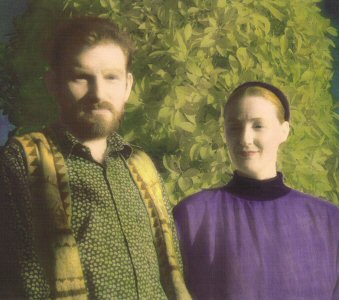
" If you were listening to pygmies you' d have a priest coming around to your door, saying 'we can save you, it's not too late!'" laughs Brendan in dry amusement.
" Exactly!" agrees Lisa. "There were all these morality crises! Now people have these choices, and can identify with something that they can be intimate with. I think that's healthy."
" There's also another gicle where there is this strange tenuous link with Western European oriented cultures. Once something is dying, there's this preservation sense: preservation of animal lifeforce, preservation of societies, people's rainforests. You have this danger¬ous zone before people will actually say' enough is enough, we must stop here:" Brendan reasons. "And now there's an awareness of these musics and cultures as a result of that."
And that is reflected on this stirring album. We're arriving at what makes Dead Can Dance truly unique: their perceptions, not just their history. And much as there's a sense of peace on Into the Labyrinth, there' s also a keen edge of anger about the abuse of the world cultures and the erosion of the tribal instinct. "'Tell Me About The Forest' is about that," agrees Brendan, "about watching the graduaI erosion of cultures and peoples, ruralized people around the world, seeing emigration as a key to the cultures of the world, all the capitalism mechanisms that rot people of their spirituality, of their roots. It' s the positivism of asking, 'can you tell me where you came from:" he murmurs. "It's strange. Because in America there's such a mixture of European cultures, and I get fascinated with your history. And it amazed me that's there's this total rejection of where people came from, in order to subscribe to the concept of the Ameri¬can dream. You can change, and it' s all part of this modernistic ideal where you must strive for this destiny in the future, and it all works in this linear line: modernism, western science, technology is our savior, that's the Godhead. That's what they work for. But when you've lived among people with ancient traditions, you understand that cultures work in a circular way, a pattern of circles, time: it comes and it returns. Religions are reincarnated, they're not in a straight line up to heaven or a straight line to hell. We've become part of this cosmos, and we turn and we arc as a being... we return to be able to respect the things that have brought us to this point."
Brendan, respect is the key ward. Respect for the culture of your ancestors... too many people are embarrassed about their differences. Why do so many people change their names?
" I find that strange in American, this contrast, this dynamic be¬tween the American dream and the past of cultures of disrupted, uprooted people who come here," expresses Brendan.
Lisa takes up the thread of Brendan' s thought. "People are not content with their lot in life. When you look at people like ourselves, from our sort of age group, when you arrived at 18 or 19, that age group, you go 'hang on, I don't like this, this isn't what I had plans for!' You can still see... there's a point, even though you've been indoctrinated by Your education, there' s the moment where's there's a gap and it's the breaking point for some young people. They can sense that there's something else living in their unconscious being..."
" They are yeaming..." supplies Brendan.
" Yes! Then all of a sudden they are thrust out of that... five years clown the track you don't even see any of that, because it's gone! And it's that that we held auto with two hands!" she laughs, grasping the table edge with all her energy. "That's what you must maintain, and it's really hard! And I encourage every human being to be a brave spirit, and hang auto to whatever it is, and try to hold through any creative means, even if it's only the ability to communicate. Try and keep this real thing in Your life!"
" This world needs that adolescent tension. It's sad to see it being sucked up and manipulated by society in terms of they sell the enthusiasm of youth back to the youth, in all the accessories, all the trappings, the look. And they manufacture the youth as a result, and it's so sad as we're not bringing forward that real optimism," mur¬murs Brendan in disgust. "The beauty of naiveté..."
" That's not being handed clown, is it, that beauty of naiveté..." despairs Lisa, she allowing Brendan to point out, "It's looked upon as a weakness..." before tuming her entire focus on her words. "Hundreds of years have gone by and people have been doing these clacka-ta-clacka-ta-clacka of drumming, and it's been handed clown, and it's hundreds of years old. Bloody hell, what hope have you got in the west, really? You've got to go out there and find it. You've got to work it out for yourself, and it's bloody hard to find it. No one is going to put it in the palm of Your hand. It's not like from the age of five you've been... clacka-ta-clacka. You don't have these rituals where you're brought into touch with Your inner being. We've been brought up to deny the inner being!" Lisa's melodic voice becomes strident in her anger. "What was it I heard the other day... don't trust your feelings! Your feelings are never going to help the future!"
" But you should get in touch with Your feelings!" sneers Brendan. "They go from one extreme to the other!" exclaims Lisa, looking at me for my opinion.
I agree: they need to teach staying in touch with yourself when you are 18, instead of having a society of wounded 40 year olds in therapy seeking their inner child.
" When are we going to break this constant echo of our culture that just keeps chuming out robots? When is that going to tum? I'd like to see that tum in my lifetime! There are a lot of really brave people desperately trying to tum the wheel, but it's hell! It's a real struggle!" Lisa is taut with passion, halting to stare at Brendan.
Brendan steps right in. "As a society we don't have the resources to deal with these problems. Everything is so mapped out and channeled. That's one of the things that we have leamed through our relationship with music, the therapeutic value, the educational aspects through our music. It's interesting the way rural-oriented cultures deal with these problems, in terms of transe untic music, which our Christian society tends to look on as primitive, barbaric. They are dealing with the primeval, the darker side of things. There are darker sides of yourself that are inhabited by the demons that you suppress. All sorts of things happen within a repressive society, or within a repressed individual. It's amazing that the music is such an incredible medium to open up the channels to release these things: to feel ecstatic about yourselves, about Your body and the world you live in. To be able to give vent to your frustrations: if you're angry, show anger!
" There are mantric musics, things that lend themselves to you being able to stop the consciousness from having too much of a bearing on Your exorcism, and to let the uncon¬sciousness pour through. You can see what it is inside you that you have repressed and say goodbye to it."
Release that vicious mental pollution instead of holding it in. And music can be the source of release.
" Right. And the relationship in the West, in terms of music, is preposterous. You put a violin a five-year old' s hands and expect them to leam a violin, which is an incredibly compli¬cated piece of machinery! We should be putting drums into their hands! Have them grow, get them rooted!" he declares.
Lisa exclaims, "Exactly! Because when they do that, well, you don't love the violin, so you must not be musical!"
" And then they have this hang up for the Test of their lives," as Brendan shakes his head with a mock sigh. "I only got to grade three in piano. Ah well!"
" You can't sing! You can't sing, you don't have a voice, it's flat! As if flat or sharp has anything to do with singing anyway!" snaps Lisa with wide-eyed anger.
" That's because the way we approach music is as entertainment," continues Brendan. "And there's too much of an emphasis of it as entertainment. It should be a necessary part of the culture. It should be a part of communication, for education, therapy, for meditation."
" And not something that's necessarily cultivated, either. Some¬thing that's raw... not something that's..." as Lisa deepens her voice to adopt a mocking cultivated talle, "it has to fall on the ear, it has to be homogeneous..."
Brendan laughs merrily, "Homogeneous. I like that ward. That' s a good one."
It's a dairy term, isn't it? Mooosic for the herd, eh?
Lisa smiles at our laughter, murmuring "You do understand. It doesn't have to 'fall' on the ear. It should stir..."
Lisa' s passionate discourse on the voice makes one realize this was the reaction she got when people first heard her magnificently warm and compelling talles. She sighs, describing, "I have had a problem with the press because of the way I sing. So I stopped speaking to the press. I thought that one clay it would be possible to speak again, and it's coming into that period now. The English press is quite strong, and they're very cynical, and if they're not cynical, then no one cafes what the heck they have to say. I couldn't deal with it.
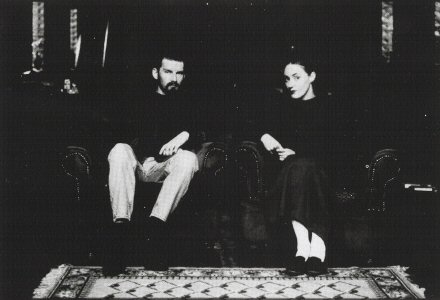
" There were fake interviews that were set up with me and Big Daddy, a wrestler. It was quite sweet, actually, but I just thought that there is no point in speaking to these people if they can speak for me. They're not going to write anything I say. The premise was a famous football commentator was interviewing Big Daddy and I at the same time, and I was sort of floating around with my head banging off the ceiling being extremely ethereal," as her rich voice wells into laughter. "That was enough of that.
" 1 sing in a language that speaks or grows by itself, and I have tried to explain how the work is to me, and it never works," she sighs anew. "It's a language, or a mouth instrument, or a tangue drum, or whatever you want to call it. But I work tram the sound of the music and create music and that's it! And I don't feel I need to orchestrate what I am doing into a libretto or a literary form. I feel there is an essence within my work that speaks for itself. And I have lived with that, and that is enough for me to contemplate.
" It's very hard... the work either speaks for itself or it doesn't. And they when you try to encourage other people into the same arena that you are working with... 1 know sound poets and people that are doing things without words that are really powerful. They're like.." she imitating a chilling garble of voice, "along with barking..." as she laughs at her own imitation. "But I don't feel that 1 can do that without music. But I also don't feel I should be afraid to talk about the work."
Now when you do it so well. We further explore the concept of music as therapy, and question why people turn to drugs instead of working on untangling their twisted life web. The effect of drugs on the culture and vision of the artist brings Brendan to point out, "lt's interesting, because the Cabala mentions it, also in Buddhism." (FYI: the Cabala is a body of Hebrew occult doctrine bath written and implied. First texts appeared in 300AD and followed until around 1300. The doctrine had a profound impact on medieval literature.) "They have a much more intelligent relationship to the context of drugs and altered states of mincis. They term it as illegal entries into the cracks, the veneer. It's like a parallel universe running alongside of ours, which we can enter into, and get a taste of: it's a tear in the meta¬physical garment. They teach that when you take these drugs, you' d better be prepared for what' s going to happen; you had better know what you are doing. You're using this source to gain illegal entry into another dimensionality.
" It makes it clearer... the reason that artists become so attracted to minci altering substances is principally through their art. Through music or painting or whatever medium that they use, they do get glimpses into that alternate world. But they do it naturally. But because they can't maintain it, these little revelations, in their des¬peration of trying to be there all the time... then it bec ornes true escapism. I don't really want to live in this world, I want to live in that one," he gestures. "There's this suicidaI premise to these drugs, like heroin; generally they aren't really happy because they can't have everything. There' s Jim Morrison saying 'I want the world, and I want it now.' That's the ranting of someone who cant have what they want all the time."
And that seepage tram the alternate universe... "That's the addic¬tion," ends Brendan.
So the trick is to gain access through the minci, not substances. Just say no doesn’t cut it: try asking why or what are you trying to escape?
" It's so hard to get to the bottom of what the problem is. I dont think anyone is really equipped to get to the bottom of the problem of people' s lives," murmurs Lisa in reflection. "We are all groping in the clark, because we don’t have that cultural story told everyday that tells us who we are within our community, within our families and friends' realm. We don’t have that cultural connection. We are alone. The only way that medicine, [that] wicca shamanism works, because you can bring a person back, you can sing them their story, remind they how they are within the culture. You can bring them back to health through song, through sand painting.
" We don’t have the tools to do that because we've thrown our children away; we've thrown our friends away! We work hard to create some inter-reactory relationship with our friends, but then as soon as they are in trouble it' s like," as Lisa adopts a cruel voice, '" oh God, I don’t want to know that guy, he's on the way clown! Have you seen him lately?'" she ends, her voice falling away as she widens her expressive eyes at the horror of it.
" It' s an anthropological problem. How can the individual equate with the tribe, which is essentially the problem, because we tend to celebrate the individual at the expense of the family, friends, tribe. The individual is what we are searching for. When you think about it, it's about being gods. That's what it's leading to, because the future is always governed by the projection of any given ideology. And that seems to be the line of thought. But the tribe is the balance of harmonization, the sense of true democracy. The most balanced civilizations have found the terms of that," Brendan explains.
Time for the eternal pessimist to step in. To me, we have lost any sense of that tribal unit y due to westernization. That type of healing sounds like an impossible goal in this fractured country because...
Lisa startles the entire roof top with her loud sharp, "NO! No, it isnt!" There's no escaping her urgent stare. "Look at it... imagine if you broke clown completely, and someone came, a pers on from Your family, then they gathered, and they said ok, this woman is broken clown. They did a diagram, be it a sand painting or a drawing on parer, and they said you were barn of this mother and this father, and they methodically went through the entire story of Your life, to help you re-find Your beginning, and to identify with who you were... it is not impossible for us to do that! We must do that for our children... we must resume the responsibility!
" 1 say this about western society: you're always looking in the wrong place! You're always looking clown and around and Qver... and it's right here!" as Lisa firmly gestures at her heart. "lt's so little, it's so simple! And we can return to the familiar state, instead of isolating ourselves tram the people who love us the most. We have a responsibility to each other, dont we?"
And it makes you feel very good inside...
" Of course it does! Look, if I am depressed when I am on tour, sometimes when I am in a situation where I am completely lost, and I need to connect, I just shut my eyes and just pretend I am on a train station with my whole family. You have this familiarity, and when we look into other cultures, what is it that makes them strong? Familiarity. Songs that are thousands of years old. A drum beat drumming that wakes up the same familiarity... Your medicines.
" And that's what we make, medicine. We make medicine for ourselves, and hopefully make medicine for other people. A way out, a way to something familiar. And I know that people think there's something familiar in our work, because of the response that we've had. 'I feel like I am coming home when I hear Your music.' "I have been to live concerts when I have experienced it. 'Oh, I’ve left, I’ve had the air under my feet...' you go home and it' s like, God, I have to get working again, and I have to get back to this, and it's lovely!" she laughs lightly, breaking the very serious mood we have woven in the darkness. Speaking of being transported... are we still in Los Angeles?
But that's the sublime magic of Dead Can Dance. They touch something in the subconscious that brings Your spirit out into the light, no matter who or where you are. Lisa feels, "But it's not only our music. You can find other music that hasn’t been corrupted or tainted by ego. They can connect with those things as well. People are going right out of our way to take us out of our deluded state..."
But it's so much more apparent in Dead Can Dance' s music. You make it easy for people to find grace. "They must be able to because we can. We can while we're making it. It's so wonderful, although it is difficult at times," Lisa admits. "There are times even when we describe songs to each other, it's like 'my God, it's like spiders running over Your grave...'"
" WHAT?" erupts Brendan, his face a mask of mock rage. "Censor that! That thought is essentially Gothic!"
Lisa laughs at him, continuing, "No, you know what I mean! How we describe things to each other."
She abruptly draps her voice to murmur, "The nicest thing about the interview is forgetting it is an interview, which I had done," as she darts Brendan an accusing look with those intense eyes.
Brendan falls contrite, murmuring, "I was only joking."
" But the nicest thing about us making a record together is just enjoying those moments. Brendan might come along and do some¬thing on his keyboard..."
" Yeah, I go 'what's this spider doing on my keyboard?'" he laughs with a wicked grin, unable to contain himself.
This time Lisa completely ignores him, continuing, "But things open up, and you can see a way. Anyone who says it's a pretentious statement isn't in touch with the work. Anyone who says, 'oh, I just do it. It's nothing. I just go clown there and do it, and that's all it is,'" she mocks in a masculine voice.
But many musicians have that odd attitude: oh, I have talent? Not me!
" That's because they're afraid. And it's not to be afraid, it's to be brave. They are so scared that other people are going to think that they're a bit mad, or romantic. Oh, romanticism, we aren't allowed to be romantic," she sighs.
" Especially when you have got a lot of ego involved, or personality. The last thing people want to hear is it came from my unconscious, willingly. No, I am in contral of my faculties. That's another disease that we have, we are 50 ego oriented. Conscious? Yeah, I have got a consciousness. I keep it in the boat of my car. Clear out, I'm driving this fucking car clown the road, not the unconscious. It is really a head strong attitude. Oh, sorry, Li," Brendan grins.
" Oh, no I' m fine... the well is dry," she laughs in dismissal of his interruption. "That's a rare thing!" he jests, still laughing.
Time to interrupt. That's one of my points, and you're proving it by your solid grasp of what you do: there aren't enough groups like yourself consciously creating therapeutic music as a tribal healing experience, using ancient cultures and rituals. (And no, I am not going new age on you.)
" No, That's not true," declares Lisa. Now it's my turn to ask for names!
" Well, we can't hear them!" she exclaims. "This is the bloody problem.
Brendan is starting up a record label now, and he' s going to try. He can't possibly release it all, but the more people who are releasing music the better. People are making a lot of money off music.
" The money should be going into creating the gate that leads you... you said in, but I'll say out of the muddle," she describes. "It' s life or death to me whether I am communicating and that person' s soul can hear what I am communicating. Or can they hear with that inner ear... soul is ambiguous."
But it's back to that problem of the individual. Most artists aren't going take their money and put it back into more music! Some worthy people do start labels to help others, but they're usually not the mega-millionaires.
" No, I'd rather build an amusement park," sniffs Lisa dryly.
Brendan seizes this almost catty remark. "Who are we talking about now?" "Why, I don' t know," replies Lisa with wide-eyed innocence.
Text – Sandra A.Garcia – Photos – Sandra C.Davis
Magazine B-Side Dec93 / Jan94